
What Happens to My Health Insurance When I Turn 65? Key Facts
In my early 60s, I remember wondering, “What happens to my health insurance when I turn 65?” If you’re in that boat, you’re not alone. You might be sorting through terms like Medicare Part A, Part B, or COBRA while juggling employer or private coverage. So if you’re asking, “What happens to my health insurance when I turn 65 if I’m still working, if I have COBRA, if I’m self-employed, if I’m worried about penalties, or if I just want to keep my private plan?” trust me, I’ve been there too. Let’s clear up some confusion so you can make the best decision for you and your family.
Explore Medicare At 65

When I turned 65, I learned about Medicare’s different parts quicker than I ever thought possible. Usually, if you’re already receiving Social Security or Railroad Retirement Board benefits at least four months before your 65th birthday, you’ll be automatically enrolled in Part A (hospital insurance) and Part B (medical insurance). If not, you have to file an application (known as your Initial Enrollment Period) which lasts seven months, starting three months before you turn 65 (Medicare.gov).
- Part A usually comes with no premium if you’ve worked at least ten years (or 40 quarters).
- Part B requires a monthly premium unless you decide to delay it for valid job-based reasons.
- Part D is for prescription drugs, and enrolling late may mean a penalty.
- Medicare Advantage (often called Part C) is offered through private insurers. Some people prefer it for its out-of-pocket maximums, which Original Medicare doesn’t have.
A Quick Look At Enrollment Periods
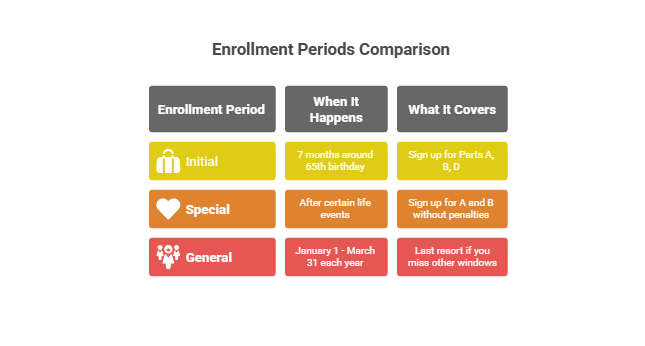
| Period | When It Happens | What It Covers |
| Initial Enrollment Period | 7 months around your 65th birthday | Sign up for Parts A, B, D |
| Special Enrollment Period | After certain life events (loss of coverage, etc.) | Sign up for A and B without penalties |
| General Enrollment Period | January 1 – March 31 each year | Last resort if you miss other windows |
(Missing your Initial Enrollment Period might lead to penalties, so it’s crucial to mark your calendar.)
Consider Employer Coverage
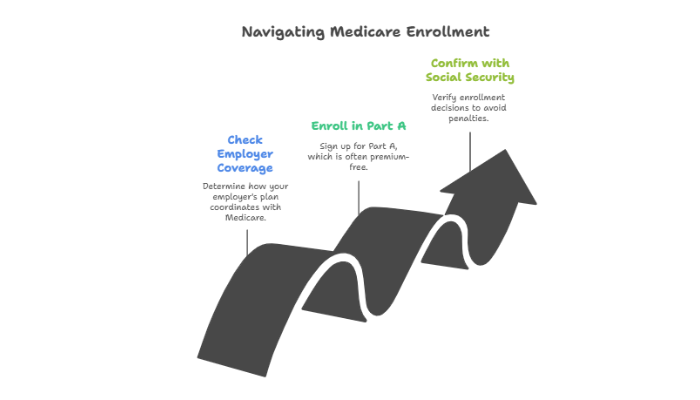
If I or my spouse was still working when I turned 65, I wanted to know whether I should enroll in Medicare right away. If you have employer coverage through a job with 20 or more employees, you might be allowed to delay Part B. However, smaller employers sometimes require you to enroll in Medicare, or they reduce the benefits they pay after you turn 65 (Medicare.gov).
- Ask your HR department how your employer plan coordinates with Medicare.
- Even if you keep your employer coverage, Part A is often premium-free, so I personally signed up for it anyway.
- Be sure to confirm with Social Security or Medicare to avoid late enrollment penalties if you decide to wait on Part B.
If you’re planning your overall retirement strategies, it can help to speak with a retirement advisor. They can also discuss whether your plan works best with a s corp retirement plan options approach or other advanced strategies.
Mind Your Enrollment Deadlines
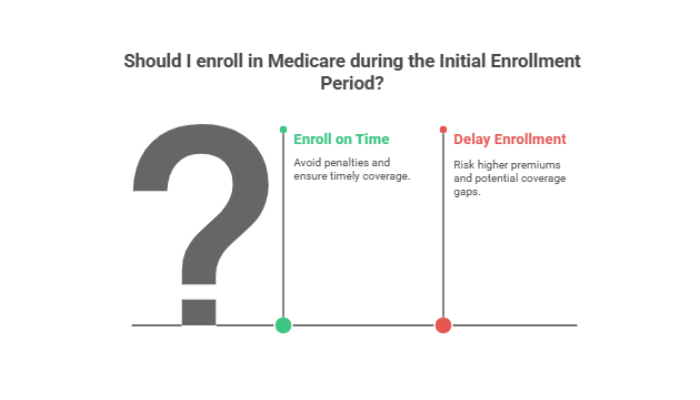
Delaying Medicare might come with financial consequences. When I didn’t enroll during my Initial Enrollment Period, I faced the possibility of higher monthly premiums:
- Part B Late Enrollment Penalty: Typically an extra 10% added to your premium for each 12-month period you could have had Part B but didn’t (CMS.gov).
- Part D Late Enrollment Penalty: Roughly 1% of the national average premium multiplied by the number of months you were without creditable drug coverage (KFF).
Special Enrollment Periods
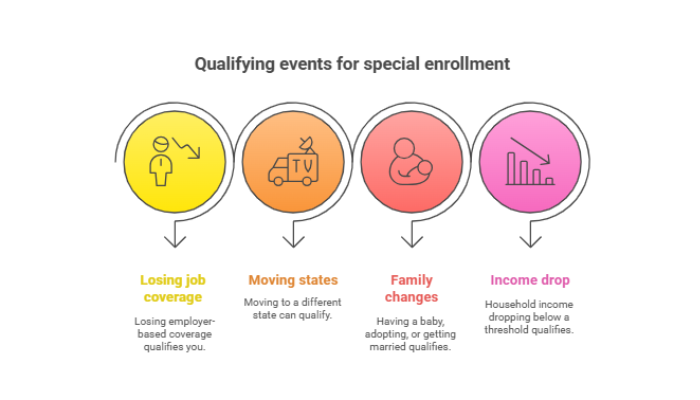
The good news is, certain life events trigger a Special Enrollment Period. For instance, if I lost my employer-based insurance or became self-employed and lost my job-based plan, I’d get a chance to enroll without a penalty (Healthcare.gov).
Examples of events that may qualify you for a Special Enrollment Period:
- Losing job-based coverage.
- Moving states.
- Having a baby, adopting a child, or getting married.
- Household income dropping below a certain threshold.
If you’re self-employed and considering the best way to save for retirement, you might look into a best retirement plan for self employed approach that aligns with your Medicare timeline.
Coordinate Multiple Coverages
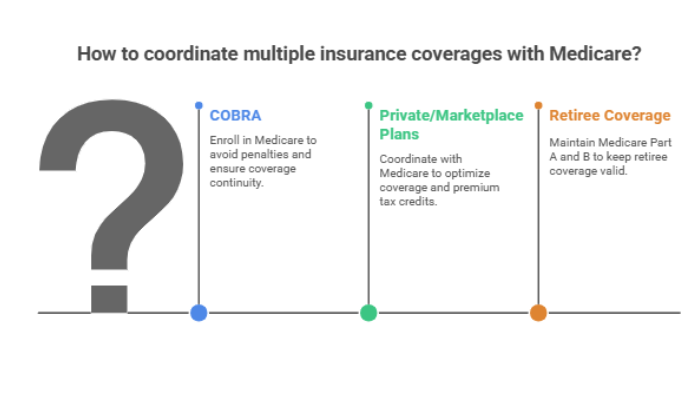
Sometimes, you have retiree coverage, COBRA, or even private Marketplace coverage. Understanding who pays first can be confusing. Generally, Medicare is primary if you’ve signed up, which means it pays before your secondary plan kicks in (Medicare.gov).
- COBRA: If I decided on COBRA after leaving my job, I learned it wouldn’t extend my Medicare Special Enrollment Period. I would want to enroll in Medicare right away to avoid paying penalties.
- Private/Marketplace Plans: If I have private insurance, that plan may reduce what it pays once I’m eligible for Medicare. The recommendation is usually to switch to Medicare or coordinate both. Your premium tax credits typically end when your Medicare Part A begins (KFF).
- Retiree Coverage: Some employer retiree plans require both Part A and Part B to remain valid. Always check with your benefits administrator to avoid losing coverage.
For industry-specific questions, like how teacher retirement coverage interacts with Medicare, you might also explore resources such as do teachers have 401k, or if you’re involved in nonprofit work, a 401k for nonprofit plan can be part of your overall planning.
Wrap Up And Next Steps
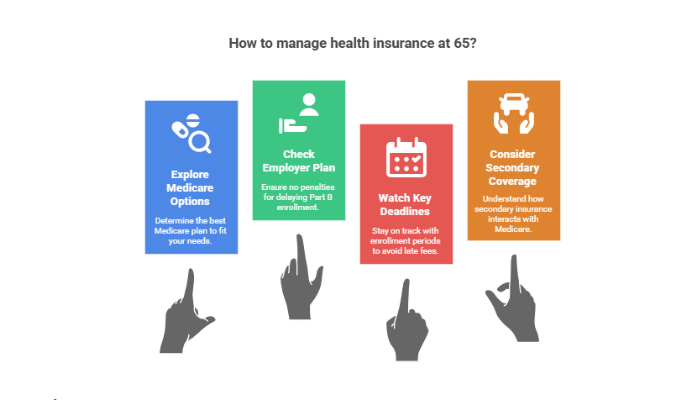
When I first asked myself what would happen to my health insurance at 65, I felt a bit overwhelmed. But once I understood how Medicare works, confirmed my employer or retiree coverage rules, and watched my enrollment windows, everything started to click.
- Explore Medicare Options: Assess whether Original Medicare or Medicare Advantage fits your needs.
- Check Your Employer Plan: If you or your spouse are still working, ensure you won’t be penalized for waiting on Part B.
- Watch Key Deadlines: Mark your seven-month Initial Enrollment Period on the calendar.
- Consider Secondary Coverage: If you keep COBRA or private insurance, know who pays first.
For more detailed strategies or if you’re managing a large portfolio, you might consult a certified retirement planner. They can help you coordinate Medicare with your broader wealth management goals, including ensuring the right fit with 401k providers for small companies or retirement planning for specific professions.
My best advice is to review your options early, keep track of your special or general enrollment periods, and ask questions if anything is unclear. Trust me, the better informed you are, the calmer you’ll feel about your medical costs and coverage when that milestone birthday arrives. Remember, you’ve worked too long and built up too much to risk losing out on timely, cost-effective health insurance at 65.
Showcase your recognition by adding our award badge to your website! Simply copy the code below and embed it on your site to highlight your achievement.

Recent Posts
Retirement Planners in Los Angeles to Consider
Los Angeles, a city synonymous with opportunity and innovation, is...
Retirement Planners in New York to Consider
Navigating the financial landscape of New York can be overwhelming,...





